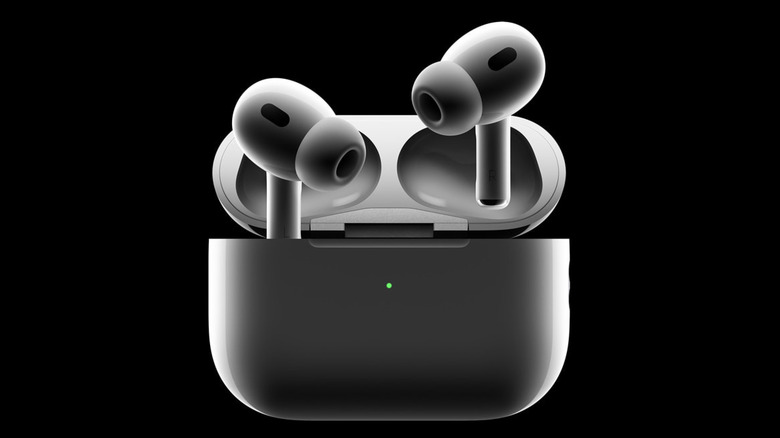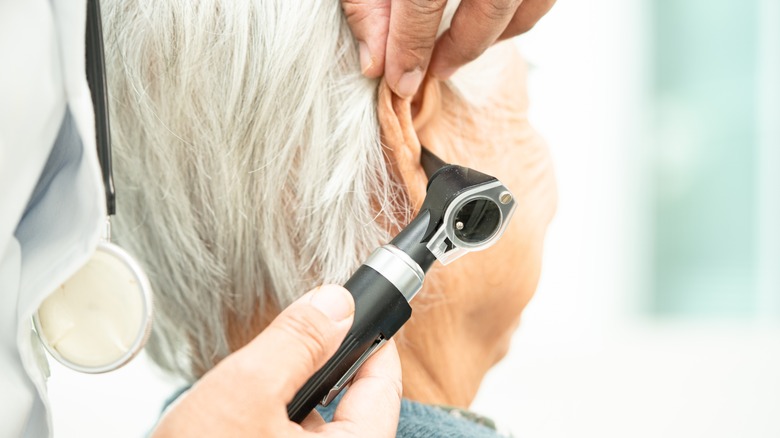Apple's AirPods Pro Hearing Aid Mode Already Has The Green Light From The FDA
When Apple announced that AirPods Pro 2 would receive a hearing aid feature earlier this week, the potential excitement of those afflicted with partial hearing loss was reserved since the medical technology had not yet been approved by the U.S. Food and Drug Administration (FDA). It turns out that it wouldn't be a long wait after all, though, as the FDA announced approval for the technology just a few days later. Technically, the approval is for the Hearing Aid Feature — the first over-the-counter hearing aid software application — which is what's incorporated in newer models of Apple AirPods Pro.
Hearing Aid Feature allows users to customize hearing devices to best meet their needs without having to seek out a doctor or other medical professional. The software is set up through iOS using an iPhone or iPad, where Apple users can then adjust settings — such as volume, balance, and tone — through the iOS HealthKit. Compatible AirPods Pro then apply these settings to boost the soundscape for users.
Apple announced that its AirPods Pro 2 would be updated with this feature later this fall, though its newest headphones — AirPods 4 and updated AirPods Max — will not. These new products were announced at Apple's September 9 event, which also introduced the new iPhone 16 and Apple Watch Series 10. The latter, like previous Apple Watch devices, also includes a Noise app that measures surrounding decibel levels to help users protect their hearing. In recent years, Apple has focused heavily on health and wellness applications for its mobile devices and wearables, including its controversial blood oxygen measurement technology, as well as sleep apnea detection built into the Apple Watch Series 10.
Over a billion people worldwide suffer from hearing loss
With FDA approval, the company has finally delivered its long-anticipated hearing aid functionality for its newest generation of AirPods Pro. It's not a niche technology for a small handful of people, either — according to the World Health Organization, around 1.5 billion people — or nearly 20% of the global population — live with some form of hearing loss, which can negatively affect personal and professional communication and emotional well-being, among other potentially serious health issues.
The FDA, which oversees medical technology in the U.S., says this statistic includes 30 million American adults. That's exactly why the organization established regulations in 2022 to allow for over-the-counter hearing aids to be approved and sold, making it a lot easier for people to combat mild-to-moderate hearing loss. The Hearing Aid Feature was reviewed under a streamlined pathway for quicker official approval by the FDA for low-to-moderate risk devices after a clinical study with 118 subjects across the country was conducted. The results of the study showed that the technology achieved comparable results with professional hearing aid fittings and didn't appear to lead to adverse side effects.
"Hearing loss is a significant public health issue impacting millions of Americans," stated Michelle Tarver, M.D., Ph.D., acting director of the FDA's Center for Devices and Radiological Health. "Today's marketing authorization of an over-the-counter hearing aid software on a widely used consumer audio product is another step that advances the availability, accessibility and acceptability of hearing support for adults with perceived mild to moderate hearing loss." With FDA approval, Apple users can expect to use the Hearing Aid Feature in compatible AirPods Pro later this fall.

